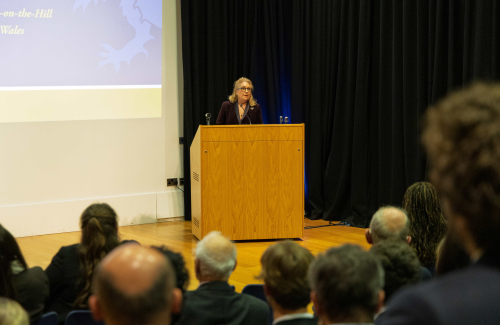More Pembroke news
Pembroke College Hosts Jisc and JSTOR Anniversary Celebration
NEWS |
40 academic, library and publishing leaders from across the UK and U.S. gathered at Pembroke College on 3rd July 2018 to commemorate a two-decade-long relationship between Jisc and JSTOR. Both these organisations are jointly committed to using technology to advance research and education.
In attendance at the event were several individuals that spearheaded the Jisc-JSTOR relationship in its infancy, including Pembroke’s Master Dame Lynne Brindley. Speakers were joined by current UK library leaders and several JSTOR content contributors, including representatives of some of the oldest learned societies in the UK.
JSTOR is well-known to Pembroke’s community as a high-quality digital resource for accessing thousands of academic journals, books, and other materials. Its holdings date back to the 1500s and cover the humanities, social sciences, and life sciences. Jisc provides many technology related services to Oxford and across the UK higher education sector including the Janet network and digital content.
In 1998, JSTOR was little more than an idea. Its database included just 47 journals. At that time, a partnership was struck with Jisc. Jisc had received a mandate to help to build shared library resources, in part the result of the Follett Report which suggested ways in which UK higher education could expand to serve increasing numbers of students. Jisc invested in JSTOR and enabled participation among UK colleges and universities. The arrangement also included hosting a mirror site of the JSTOR database at the University of Manchester, both to support faster access and to provide assurances around the long-term viability and continuity of digital access. Signalling the importance and unique nature of the relationship at the time, the JSTOR-Jisc agreement was signed at an event at the U.S. Embassy in London in 1998.
20 years later, the organisations have much to celebrate. Their efforts have vastly increased the digital content available to faculty and students in the UK. Nearly 200 UK higher education institutions participate in JSTOR and their faculties and students are among its heaviest users across the world. Together, they have accessed content on JSTOR 116 million times in the last 4 years. 150 different organisations in the UK, from university presses to learned societies and libraries, now make their content accessible through JSTOR.
Dame Lynne commented: “I am really proud to have played a key role in bringing JSTOR to the UK. From our vision of enabling all universities to provide a rich range of electronic content, accessible to all and free at the point of use, we were able to deliver an extraordinary step change for UK students and academics.”

